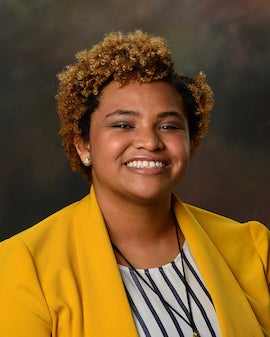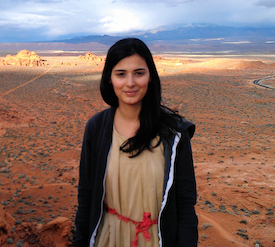UCAR announces 2020 Next Generation Fellows
New cohort of fellows join program for students in Earth system science from underrepresented communities
Sep 1, 2020 - by Ali Branscombe
The NSF NCAR Mesa Lab, Fleischmann building, and Mesa Lab Road will be closed through Friday, Dec. 27, due to nearby water leak and repairs.
View more information.Sep 1, 2020 - by Ali Branscombe
The University Corporation for Atmospheric Research (UCAR) is pleased to announce the fourth cohort of the Next Generation Fellows. The fellowship program provides support to rising Earth system science students from underrepresented communities.
The 2020 Next Generation Fellows are: Akilah Alwan, diversity and inclusion fellow; Yelizaveta “Liza” Khmara, public policy fellow; Samar Minallah, Earth system science fellow.
UCAR will fund the fellows for two years of graduate school. Each fellow will also participate in a summer internship for two consecutive years with UCAR and the National Center for Atmospheric Research (NCAR), which is managed by UCAR on behalf of the National Science Foundation.
“These three fellows represent the future of Earth system scientists whose interests and influence extend beyond scientific research to intersect with policy and social justice,” said UCAR President Antonio Busalacchi. “Their work and goals represent the rising scientists in our field who will, and already are, using scientific problem-solving skills to help provide global solutions to a variety of societal problems. We are very proud to welcome them to the UCAR and NCAR family.”

Akilah Alwan -- Diversity and Inclusion Fellow
Auburn University
While she is pursuing a doctoral degree in Earth system science, Alwan also centers social justice and equity into her work in the geoscience community. Alwan defines her role in geoscience as a “space-maker” who ensures everyone has a seat at the table. Combining geosciences with the theoretical framework of Critical Race Theory, developed in the social sciences, Alwan’s dissertation focuses on the pathways Black geoscientists take in their research fields and what factors influence their professional development and careers. While the primary focus of her research is on the experience of Black geoscientists, she also plans to look at the intersection of race, gender identity, and sexual orientation.
Alwan sees the Diversity and Inclusion Fellowship as an opportunity to gain first-hand experience in diversity, equity, and inclusion initiatives in the Earth system science community, particularly in pioneering her own projects to support these goals. She plans to start an Earth system science lecture series and accompanying podcast to highlight the paths that lead scientists to their fields of research. These projects will feature early career and rising scientists, particularly those who hold minoritized identities in STEM, to improve their visibility in the field. “My ultimate vision for this fellowship is to help young students who hold minoritized identities see themselves in science in a way that they never previously have. It may be learning about a meteorologist who looks like them, or a first-generation physicist doing work they did not even know was possible. These projects will help make diversity and innovation a reality, because they bring underserved scientists to the forefront,” said Alwan.
Yelizaveta “Liza” Khmara -- Public Policy Fellow
University of Miami
Khmara is pursuing a doctorate in environmental science and policy at the University of Miami, where she interrogates the narrative of the trade-offs between human well-being and environmental protection. Specifically, she studies the socioeconomic impacts of protected areas and what influence governance structures and mechanisms have on protected areas themselves.
“Broadly, my research is asking the following question: How can governance be developed in order for protected area policy to be effective in environmental protection, and what is the nature of the socioeconomic impacts of these policies?” said Khmara. “I am looking forward to exploring ways to develop policies that integrate scientific knowledge with socioeconomic development to benefit both human communities and the Earth. Working in the epicenter of policy action and formation during this fellowship will equip me with the skills required to create synergistic and salient policies for society and the environment.”
Khmara will use this fellowship to further develop her understanding of how policies are crafted and adopted. First-hand knowledge of the policy process will support her ongoing research and equip her with the skills and experience required to one day be a policy analyst.

Samar Minallah -- Earth System Science Fellow
University of Michigan
Minallah is a doctoral candidate in climate and space sciences and engineering at the University of Michigan, where she studies high-altitude hydroclimates and glaciology in the Himalaya-Karakoram-Hindukush (HKH) mountains. As a rising scientist, Minallah is interested in studying anomalies within the Earth system, particularly hydroclimate extremes that impact humans, and how human activities influence global processes in return.
Minallah is a first-generation scholar from Pakistan and she plans to use this fellowship to work with climate scientists at NCAR to help adapt climate models to better study the HKH region. “Support from NCAR scientists will be indispensable,” said Minallah. “The HKH region holds the largest glacial and perennial snow-mass outside the poles, and my research aims to address the question, ‘How will future changes in temperature and precipitation influence the fate of the region’s glaciers and glacial lakes?’”